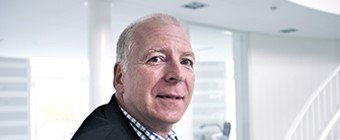Innovative installation can produce three times as much energy as traditional solar cells
04.04.2019
One of the biggest green ‘smart city’ projects in northern Europe is starting up right now in Aarhus, Denmark. It all revolves around a public housing complex which is to be fitted with new and intelligent energy systems designed to bring Aarhus closer to the target of a climate-neutral municipality in 2030.
Something very special is going on in Trigeparken just north of Aarhus. Hidden behind scaffolding, a radical renovation project is under way, to give the six blocks a massive lift both architecturally and in terms of energy efficiency.
The apartment blocks are also part of the large-scale, EU-funded climate project READY. The aim of the project is to develop and test green technologies and set new climate-friendly standards in a collaboration between the municipality, Ringgården housing association, Aarhus University and a number of private companies.
“READY is a completely unique partnership in which both private and public-sector players have joined forces to build a sustainable future for the municipality of Aarhus. This type of collaboration is a prerequisite for the green transformation and for us as a city to reach our climate targets and prepare the way for a future with 100% renewable energy,” says Bünyamin Simsek, councillor for Technology and Environment in Aarhus.
The heat and energy production of the future will be local
As part of the READY project, three of Ringgården’s six apartment blocks on Trige Parkvej are currently being fitted with a very special energy solution, a new type of photovoltaic installation that can produce around three times as much energy as traditional solar cells.
Where traditional solar cells can absorb about 20 per cent of the energy in sunlight, the new PTVT panels, developed by Racell Saphire, can absorb up to 90 per cent.
A completely new battery solution has also been developed for READY, to meet the challenges related to consumption and capacity, says Reto Michael Hummelshøj, who is the project manager for READY within COWI.
“The greatest energy production typically takes place in the middle of the day, when people are not at home and the demand is low. That is why we have worked with Lithium Balance to develop a smart battery installation which can store the surplus energy from the solar cells and make it available when residents come home and need electricity and heat. That means we can link production and consumption and enable the apartment blocks to be largely self-sufficient in green energy,” he explains.
Housing associations leading the way to a green future
Public housing has immense potential when it comes to the green transformation, so housing associations all over Denmark have a crucial role to play in implementing sustainable solutions and testing new energy initiatives.
“We have been helping to enable innovative development for many years, by backing practical measures such as energy renovations and new energy solutions which also have a global dimension,” says Ringgården’s director Palle Jørgensen.
“For the residents at Trige Parkvej, the renovation in itself means that their energy costs will be significantly lower than before. Then READY comes as a bonus. We expect the photovoltaic installation to supply electricity to the individual homes as well as to common areas and laundries.”
Trigeparken is the first step in READY’s energy renovation of public housing. This spring will see the next step, with further renovation projects in Aarhus
About the READY project
Aarhus municipality aims to take the lead in the green transformation and become CO₂-neutral by 2030, to contribute to making the global climate goals a reality. That is why Aarhus joined the smart city project READY, which was launched in 2014. With an EU grant of around DKK 143 million and a focus on energy efficiency, the project is intended to turn the cities into active partners in the green transformation.
READY stands for ‘Resource-efficient cities implementing advanced smart city solutions’, and builds on a number of energy projects in Aarhus, testing a wide range of new, renewable and energy-reducing technologies integrated with each other across the city with the aid of smart controls and energy storage.
The project is coordinated by COWI A/S and brings together more than 20 partners from five different countries – Denmark, Sweden, Austria, France and Lithuania. Växjö in Sweden and Aarhus are demonstration cities for the solutions being developed by the project.
In Aarhus there are 10 partners:
- COWI A/S
- Aarhus municipality, including AffaldVarme Aarhus (AVA)
- Aarhus University
- Boligforeningen Ringgården (housing association)
- Kamstrup A/S
- Racell Saphire Aps
- Danfoss A/S
- Lithium Balance A/S
- Dansk Fjernvarme (district heating)
- E.ON Danmark A/S
Get in contact

Reto Michael Hummelshøj
Chief Project Manager
District Heating, Denmark
Tel:
+45 29647160
rmh@cowi.com